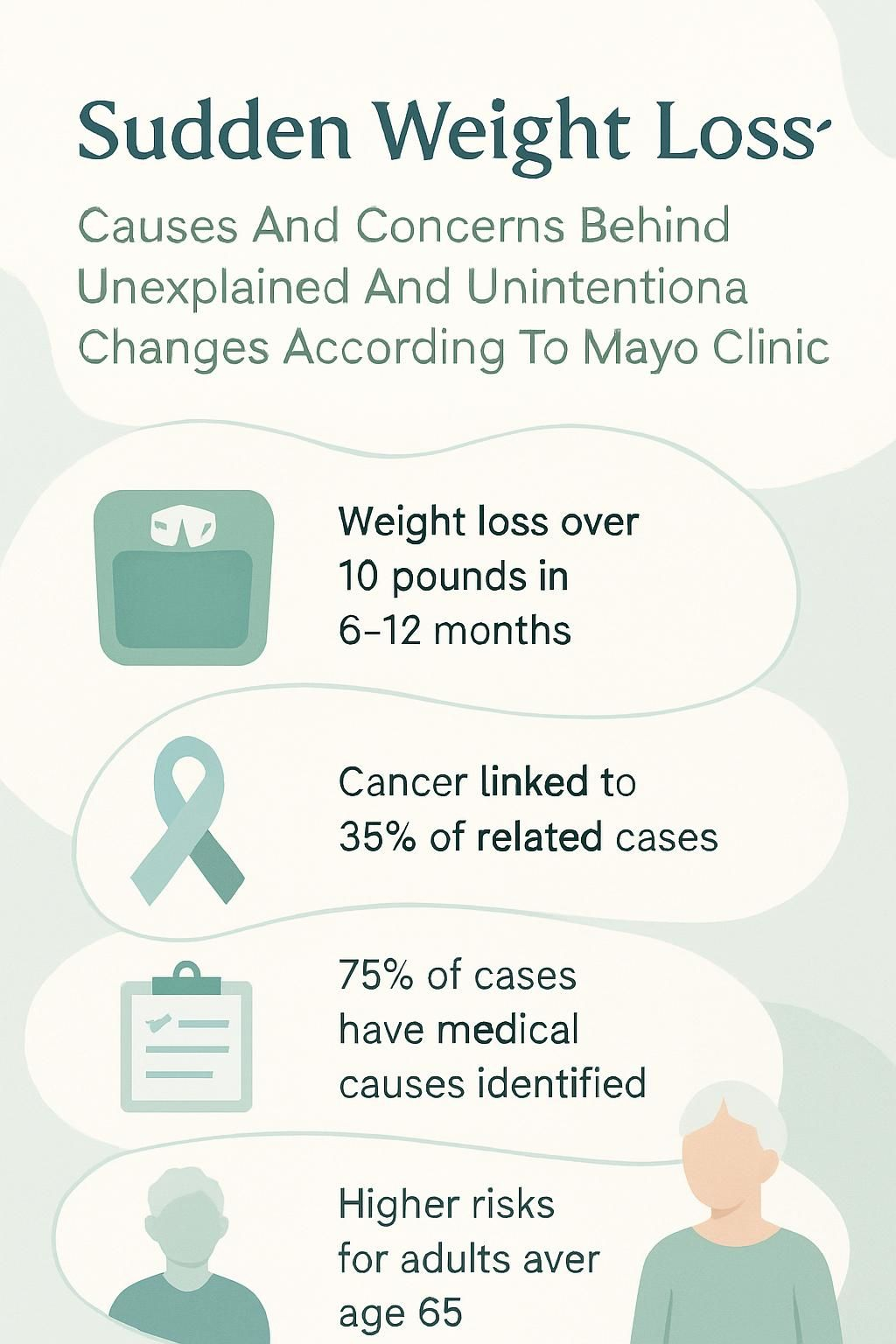Sudden Weight Loss: Causes And Concerns Behind Unexplained And Unintentional Changes According To Mayo Clinic
Our Nutrition Assistant AI Suite will transform your body. You will lose fat, get toned, and build muscle. Gain confidence and optimal health.
Noticing sudden weight loss when you are not trying can feel scary and confusing. Mayo Clinic notes that losing more than 10 pounds, or over 5 percent of your body weight within 6 to 12 months, can point to a medical problem. This guide explains what counts as unintentional weight loss, why it happens, what symptoms matter, and when to call your doctor. You will see possible causes, common tests, and practical steps to protect your health.
Key Takeaways
- Unintentional weight loss over 10 pounds or 5 percent of body weight in 6 to 12 months needs medical attention, per Mayo Clinic.
- Likely causes include cancer, diabetes, thyroid disorders, gastrointestinal diseases, and mental health conditions.
- Urgent warning signs include night sweats, ongoing fatigue, fever over 100.4°F, bloody stools, and swollen lymph nodes.
- Roughly 75 percent of cases have a clear cause after a careful history, exam, and basic blood tests such as CBC, glucose, or thyroid panels.
- Older adults, especially over age 65, face higher risk from rapid changes and need prompt evaluation to prevent malnutrition and infections.

What is sudden weight loss?

Sudden weight loss means you lose weight without trying, and without changing your diet or activity. Mayo Clinic staff advise that losing more than 5 percent of your body weight in 6 to 12 months can signal a health issue that needs attention.
What counts as sudden and unintentional weight loss?
A doctor may call your weight loss sudden and unintentional if you lose more than 10 pounds, or over 5 percent of your usual weight, within 6 to 12 months without trying. If you weigh 150 pounds, losing more than 7.5 pounds over half a year fits this definition. These thresholds help providers decide when unexplained weight loss needs a full checkup.
Unexpected weight changes are more common in older adults. Up to 20 percent report them, and rates in nursing homes can be even higher. You might notice a loved one’s clothes getting loose even though meals look normal. That kind of change can be an early sign that calls for evaluation.
Losing weight without changing your diet or exercise routine can be a sign your body needs care.
Understanding how Mayo Clinic defines unexplained weight loss can help you decide your next step.
How does Mayo Clinic define unexplained weight loss?
Mayo Clinic defines unexplained weight loss as a noticeable drop in body weight that happens without effort, without diet changes, and without more activity. It usually means at least a 5 percent loss within six to twelve months. For many people, that is more than 10 pounds, or about 4.5 kilograms.
This kind of involuntary loss can point to serious conditions, such as cancer, diabetes, ulcerative colitis, celiac disease, or major depressive disorder. Because the causes vary, a prompt visit with a physician is wise. In about 75 percent of cases, a clear cause is found after history, exam, and testing. Seeking care early often makes treatment easier and recovery faster.
Common causes of sudden weight loss
Weight can drop for many reasons. Finding the cause helps you get the right diagnosis and treatment plan.
Which medical conditions cause sudden weight loss?
Several health conditions can make you lose weight without trying. They can affect hormones, digestion, immunity, or mood.
- Cancer explains more than 35 percent of clinic visits for this problem. For roughly 40 percent of people who later receive a cancer diagnosis, unexplained weight loss is the first sign.
- Diabetes can cause weight loss when cells cannot use glucose well. The body then breaks down fat and muscle for energy.
- Thyroid disorders, such as hyperthyroidism, raise metabolism, which can trigger unintentional weight loss.
- Gastrointestinal diseases, including Crohn’s disease, celiac disease, ulcerative colitis, pancreatitis, and peptic ulcer disease, reduce nutrient absorption.
- Chronic infections, such as tuberculosis or HIV, cause inflammation and higher calorie needs, which can lower weight.
- Addison’s disease reduces adrenal hormones, including cortisol and aldosterone, which can lower appetite and cause gradual loss.
- Mental health conditions, such as depression and eating disorders, change appetite and eating patterns.
- Heart failure can lead to muscle wasting because your body needs extra energy for basic functions.
- Substance use disorders disrupt appetite and meal routines, often lowering intake.
- Dementia and dental problems make chewing or swallowing difficult, which reduces calories.
If you, or someone close to you, lose more than 5 percent of usual weight in 6 to 12 months without trying, schedule a visit with a primary care provider.
How can medications and treatments lead to weight loss?
Some prescriptions and treatments can reduce appetite, change taste or smell, or upset digestion. These side effects can lower intake and lead to unintentional weight loss.
- Drugs that alter taste or smell can make food less appealing, which cuts calories.
- Medicines for mood conditions may cause nausea or lower appetite.
- Some drugs lead to dry mouth or swallowing trouble, a problem called dysphagia.
- Medication-triggered diarrhea or cramps reduce nutrient absorption.
- Cancer therapies, including chemotherapy, often decrease appetite.
- Loss of smell, known as anosmia, can reduce enjoyment of eating.
- Thyroid medicine such as levothyroxine can cause loss if the dose is too high.
- Drugs that affect the digestive or urinary tract may raise fluid loss or reduce nutrients.
- Treatments for chronic illnesses, such as Addison’s disease or Crohn’s disease, can affect appetite and absorption.
What lifestyle factors contribute to sudden weight loss?
Lifestyle can influence your weight as much as illness. Several everyday factors reduce calorie intake or increase calorie burn.
- Substance use disorders, including heavy alcohol use, lower appetite and can damage the liver.
- Limited money, social isolation, or poor access to healthy food reduce meal quality and quantity.
- Alcohol often replaces meals, which lowers nutrition and can lead to a quick loss of several pounds.
- Major stress disrupts hunger and metabolism, so weight may drop even without diet changes.
- Stroke or other neurologic problems can make swallowing or food prep hard.
- Overexercising without enough calories creates a calorie gap that leads to weight loss.
- Too little sleep affects appetite hormones, which can reduce intake or increase burn.
If these factors sound familiar, discuss them with your clinician. Small adjustments can help stabilize intake and weight.
How do psychological causes affect weight loss?
Mental health directly affects appetite, digestion, and metabolism. Psychological causes are common drivers of unexpected changes on the scale.
- Depression, anxiety, eating disorders, and obsessive-compulsive disorder can reduce appetite and alter eating habits.
- Experts report mental health conditions account for roughly 10 to 23 percent of unintentional weight loss cases.
- Depression often causes low appetite, which lowers calorie intake.
- Anxiety can trigger stomach upset or skipped meals.
- Stress raises hormones like cortisol, which can change how your body uses energy.
- Eating disorders, including anorexia nervosa, can cause severe and dangerous loss.
- Long-term distress disrupts hunger signals and raises the risk of malnutrition.
- Good evaluations include questions about stress, mood, and sleep to find these causes early.
If you notice mood changes along with weight loss, ask for mental health support as part of your plan.
Medical conditions linked to sudden weight loss
Think of this section as a map that connects symptoms with likely causes.
How does cancer cause sudden weight loss?
Cancer can change how your body uses energy. Tumors sometimes release substances that raise metabolism, which burns more calories even when you are resting. For about 40 percent of people later diagnosed with cancer, unexplained weight loss comes first. Loss of appetite and nausea can make eating hard too.
According to Mayo Clinic, cancer explains a large share of clinic visits for unexplained loss. If you lose 10 pounds without trying, call your doctor. Imaging, such as a CT scan, along with lab tests, can look for hidden disease.
Can diabetes lead to unexpected weight loss?
Yes. In diabetes, insulin does not work well or is not present in enough amounts. Cells then cannot use glucose for fuel. The body turns to muscle and fat for energy, and weight drops. You may also feel thirst and urinate more often.
Unexpected loss, especially with these symptoms, should prompt blood sugar testing. Early diagnosis helps prevent serious complications.
What thyroid disorders are associated with weight loss?
Hyperthyroidism, an overactive thyroid, speeds up metabolism. Graves disease is a common cause. You may notice a fast heartbeat, sweating, nervousness, or trouble sleeping along with weight loss. If these signs cluster together, ask your doctor for thyroid testing.
How do gastrointestinal diseases cause weight changes?
Digestive conditions reduce absorption or make eating painful. Celiac disease, a gluten-related condition, can cause diarrhea, vomiting, and poor nutrient uptake. Crohn’s disease and ulcerative colitis often bring chronic diarrhea and low appetite. Peptic ulcers can cause nausea after meals, so intake falls. These issues limit nutrients and calories, so weight drops even if you try to eat.
What chronic infections result in weight loss?
Chronic infections can strain the body for weeks or months. HIV infection and AIDS often cause diarrhea and rapid muscle loss. Tuberculosis frequently brings night sweats, fatigue, and falling weight. Parasites such as Giardia lead to diarrhea and poor absorption. If symptoms last and the scale keeps dropping, seek care quickly for testing and treatment.
Psychological factors behind unexplained weight loss
Your mind and body talk to each other. When mood shifts, appetite often follows.
How does depression affect weight loss?
Major depression can lower your desire to eat and take away the joy of meals. You might skip food without meaning to, which reduces daily calories. Over weeks, clothes feel loose and energy fades. Studies suggest that a large share of people with major depression lose meaningful weight due to low appetite. Rapid loss and poor intake raise the risk of malnutrition, so contact a clinician if your mood and weight change together.
Can anxiety cause sudden weight loss?
Yes. Anxiety increases stress hormones like cortisol and adrenaline. These hormones can suppress hunger and speed metabolism. Many people eat less or skip meals during anxious periods. If your loss continues, talk with a healthcare professional to rule out medical causes and to treat anxiety.
What eating disorders lead to unexplained weight loss?
Anorexia nervosa involves severe calorie restriction. Bulimia nervosa involves binge eating followed by purging behaviors. Both conditions can cause striking loss that alarms friends and family. These are serious medical and mental health conditions. Early care improves outcomes and reduces long-term health risks.
What symptoms might accompany sudden weight loss?
Weight is only one clue. Other symptoms help doctors find the root cause faster.
Why does sudden weight loss cause fatigue?
Your body runs on the energy you eat. When intake drops, muscles and organs must work with less fuel. That strain causes fatigue that sleep cannot fix. Some conditions, like celiac disease or hypothyroidism, can cause both weight changes and tiredness. If you feel worn out for more than two weeks, call your doctor.
How is loss of appetite related to weight loss?
Loss of appetite means you do not want to eat, or you feel full after a few bites. Over days and weeks, calories fall below your needs, so your body uses fat and muscle for energy. Cancer, peptic ulcers, and mood disorders often cause low appetite. If this lasts more than two weeks, especially with other symptoms, seek an evaluation.
What changes in bowel habits signal weight loss issues?
Chronic diarrhea or repeated vomiting can lower weight by draining fluids and nutrients. You might see more frequent, looser stools, or notice blood or mucus. Conditions such as Crohn’s disease, ulcerative colitis, celiac disease, and certain infections are common causes. If bowel changes continue for more than two weeks with weight loss, call your clinician right away.
Are night sweats a sign linked to sudden weight loss?
Night sweats that soak clothing, along with unexplained loss, raise concern for infections or cancers such as lymphoma. Thyroid disease can also contribute. If these symptoms occur together, schedule care soon so testing can begin.
When should you seek medical attention for weight loss?
If you notice unexpected weight loss, make an appointment with your healthcare provider to review symptoms, medicines, and daily habits. A timely visit can prevent complications.
Why is losing more than 5% of body weight in 6-12 months concerning?
Losing more than 5 percent of your weight within 6 to 12 months without trying is a common red flag. Mayo Clinic uses this threshold to flag possible problems like cancer, diabetes, thyroid disease, or infections. Quick changes are risky for older adults and those with chronic illness. Early evaluation helps find the cause and start treatment while issues are still manageable.
What additional symptoms indicate urgent medical care?
Some symptoms point to conditions that should be checked right away. Call your doctor or go to urgent care if weight loss occurs with any of the following:
- Fever above 100.4°F
- Persistent, severe fatigue that limits daily life
- Night sweats
- Marked drop in appetite
- Trouble swallowing, vomiting blood, or bloody stools
- Shortness of breath
- New or worsening severe pain that lasts for weeks
- Swollen lymph nodes in the neck, armpits, or groin
- Confusion, memory problems, or changes in thinking
Who are high-risk groups needing prompt evaluation?
Adults age 65 and older should get prompt evaluation for unexplained loss. People living in assisted care or with multiple health conditions are at special risk. Anyone with chronic disease, including cancer, diabetes, or heart failure, should also seek care quickly if weight drops without reason. Early diagnosis helps avoid malnutrition and infections.
Diagnostic approaches for sudden weight loss
Doctors start broad, then narrow the focus based on your history and exam.
How do doctors use medical history and physical exams?
Your doctor will ask about weight changes, appetite, bowel habits, energy, sleep, medicines, and stress. Travel, substance use, and family history also matter. Next comes a head-to-toe exam, including the heart, lungs, abdomen, mouth, and thyroid. These steps guide which tests to order first.
Which blood tests help identify causes of weight loss?
Common blood tests can uncover hidden causes of unexplained weight loss and point to the right treatment path.
- Blood glucose to screen for diabetes.
- Thyroid tests, including TSH and T4, for overactive or underactive thyroid.
- Celiac antibody panel to check for gluten-related disease.
- Complete blood count, or CBC, to look for anemia or infection.
- Liver and kidney panels to assess organ function.
- Adrenal hormone tests when Addison’s disease is suspected.
- Inflammation markers, such as CRP and ESR, to detect hidden inflammation.
Results help your provider decide whether imaging or other tests are needed.
What imaging studies are used to diagnose weight loss reasons?
Imaging helps your clinician see inside the body and find problems early. The choice depends on your symptoms and exam findings.
- MRI, magnetic resonance imaging, creates detailed pictures of organs and soft tissues. It helps identify tumors, inflammation, or structural changes.
- CT, computed tomography, produces cross-sectional images to detect cancers, infections, or other abnormalities.
- Ultrasound uses sound waves to view the liver, kidneys, thyroid, and other organs. It can reveal cysts, masses, or fluid buildup.
- Chest X-rays look for lung infections, tuberculosis, or signs of hidden cancer.
- PET scans show how tissues use energy, which helps find active cancers.
- Endoscopy uses a small camera to view the stomach and intestines. It finds ulcers, growths, or digestive diseases.
- Bone scans look for infection or cancer spread in bone using a tiny amount of tracer.
In many cases, a basic test like an ultrasound or chest X-ray helps rule out several serious issues while labs are pending.
^1 Mayo Clinic Staff. “Unexplained Weight Loss.” Mayo Clinic, 2024.
When are specialized tests necessary for unexplained weight loss?
Specialized tests are used when first-line exams and labs do not explain your symptoms. Colonoscopy is recommended for colorectal cancer screening, especially for adults 45 and older with new bowel changes and unexpected weight loss. Urinalysis can detect kidney or bladder issues. Providers may order advanced imaging, endoscopy, or hormone panels when specific conditions are suspected but not confirmed.
Treatment for unexplained weight loss
Care works best when it treats the cause and restores nutrition at the same time.
How is the underlying cause of weight loss addressed?
Your care plan starts with the diagnosis. Infections get treated with the right medicines. Thyroid and adrenal disorders are managed with adjusted hormone therapy. Digestive illnesses may require targeted drugs or diet changes, such as a gluten-free plan for celiac disease. If a prescription causes loss of appetite, your doctor may adjust the dose or suggest an alternative. Dental or swallowing problems may need dental care or speech therapy. Each step aims to stop loss and support safe recovery.
What nutritional support helps with weight recovery?
Nutritional support can help you regain strength and lean tissue while the main condition is treated.
- Eat 5 to 6 small, high-calorie meals each day.
- Include quality protein at every meal, such as eggs, yogurt, chicken, fish, beans, or nuts.
- Pick calorie-dense snacks like Greek yogurt, nut butter on toast, trail mix, or cheese.
- Add healthy fats, including avocado, olive oil, seeds, and salmon, to boost intake.
- Use smoothies or shakes with milk or fortified alternatives, fruit, and protein powder.
- Consider oral nutrition supplements if meals are not enough.
- Work with a registered dietitian to tailor a plan and set realistic goals.
- Drink enough fluids unless your doctor advises limits.
- Track intake with a simple food log to spot patterns or barriers.
- Choose soft foods, such as soups, stews, and mashed items, if chewing or swallowing is hard.
These steps align with Mayo Clinic guidance for safe weight gain and recovery.
How can counseling and mental health care assist?
If mood or anxiety affects your eating, counseling can help. Cognitive behavioral therapy, a structured talk therapy, teaches skills to manage stress, improve meals, and challenge unhelpful thoughts. For eating disorders, a team approach that includes medical care, therapy, and nutrition support gives the best chance of full recovery. Ask your provider for a referral if appetite and mood shift together.
Prevention tips for sudden weight loss
Small habits build a safety net that keeps your weight steady.
How does a balanced diet prevent weight loss?
A balanced plate provides enough calories, protein, healthy fats, vitamins, and minerals to maintain weight. Adequate protein protects muscle, and whole grains give steady energy. Aim to include all food groups in the right portions. If intake dips after illness, add calorie-dense foods, extra snacks, and a nightly smoothie until your weight stabilizes.
What role does regular physical activity play?
Exercise supports appetite, mood, and muscle mass. The Mayo Clinic suggests at least 150 minutes of moderate activity each week, such as walking, cycling, or swimming. Strength work two days a week helps preserve muscle, which protects metabolism. If stress affected your weight, a simple routine can restore structure and hunger cues.
How can stress management reduce risk?
Chronic stress can mute hunger and upset digestion. Use short, daily practices like deep breathing, brief walks, stretching, or guided meditation. Connect with friends or a support group. Manageable stress keeps eating patterns steady and reduces the risk of unintentional loss.
Why are routine medical check-ups important?
Regular check-ups catch trends early. Your provider can compare weights, review symptoms, and order simple screening tests. Many hidden problems, such as thyroid disease or diabetes, are easier to treat when found early. If the scale shows a steady drop, bring that data to your visit.
Risks of ignoring sudden weight loss
Delays can turn a fixable issue into a complex one.
What happens if underlying conditions progress?
If the cause keeps progressing, treatment may become harder and recovery slower. Cancer and diabetes can damage organs over time. Thyroid or adrenal problems can weaken muscles and bones. Taking action early limits complications and protects quality of life.
How does malnutrition affect immunity?
Malnutrition lowers key nutrients needed to build white blood cells. Your defenses weaken, so infections happen more often and last longer. Wounds may heal slowly. If you are getting sick more often after losing weight, ask about nutrition support and testing.
How does sudden weight loss impact quality of life?
Rapid loss drains energy and strength. Daily tasks feel harder, and social plans may fade. Focus can slip at work or school due to fatigue and poor intake. Mayo Clinic experts stress that identifying the cause and starting care early can restore health and confidence.
Conclusion
Unexplained weight loss is a signal, not just a number on the scale. If you lose more than 10 pounds, or over 5 percent of your weight in 6 to 12 months, contact your clinician. Sudden weight loss can point to conditions such as cancer, diabetes, thyroid disease, or infections. Early diagnosis, good nutrition, regular activity, and stress control work together to restore your health. This article is for education only and does not replace care from your own healthcare professional. If you are losing weight without trying, schedule a medical evaluation soon.
FAQs
1. What are common causes of sudden weight loss according to Mayo Clinic?
Sudden weight loss can result from medical conditions such as thyroid disorders, diabetes, digestive diseases like Crohn’s disease, infections including tuberculosis or HIV, and some cancers. Mental health issues such as depression or anxiety may also contribute.
2. When should someone worry about unexplained and unintentional weight changes?
A person should seek medical advice if they lose more than five percent of their body weight in six to twelve months without trying. This is especially important if the change comes with symptoms like fatigue, fever, pain, or appetite loss.
3. How do healthcare professionals diagnose the reason for rapid weight reduction?
Doctors review a patient’s history and conduct physical exams. They may order blood tests to check organ function or screen for infection; imaging studies help find tumors or inflammation; stool tests can detect digestive problems.
4. Can lifestyle factors cause unexpected drops in body mass?
Yes; stress at work or home can reduce appetite leading to lower intake of calories over time. Changes in daily routine such as increased activity levels without eating enough food may also play a role.
Summary: Sudden unexplained weight loss often signals an underlying health issue that needs attention from a doctor. Medical evaluation helps identify causes ranging from chronic illness to mental health concerns while considering both physical and lifestyle factors ensures accurate diagnosis and treatment planning.







